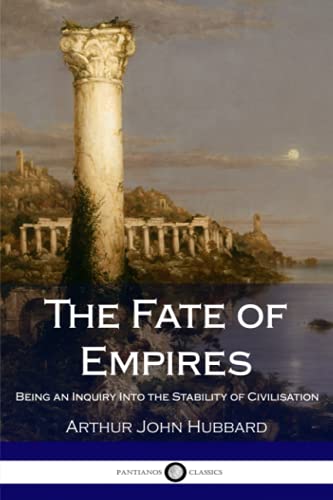The Fate of Empires: Being an Inquiry into the Stability of Civilization (1913)
According to his own statement, Mr. Hubbard in his book “The Fate of Empires” is building on the foundation of Mr. Benjamin Kidd’s “Social Evolution,” altho he treats the whole subject from a different point of view. “Is a permanent civilization possible?” is the initial inquiry. That depends on the forces which are operative in a society. But history takes account only of the results of these forces, since they can be discovered only when the whole of organic evolution is reviewed. In doing this, two forces are found to be operative—instinct and reason; the former operating in a race, tending toward propagation; the latter in society, tending toward competition with contemporaries. Instinct sacrifices the individual ruthlessly for the race, while society tries to subdue him to its own ends. We have, consequently, an antagonism between the part and the whole in each case. How is it to be removed? Neither reason nor instinct is able to do so; since reason demands the abolition of competition, and that would land us in the bogs of socialism with its mediocrity and consequent death of society; while instinct sacrifices the individual to the race, and thus keeps development on a low plane. We must find, therefore, a new suprarational sanction in the religious motive. This motive raises propagation and competition to a higher level; since it makes the individual a member of a family which extends backward as well as forward and gives him thus an interest in the future of the race, it furnishes at the same time an interest in society, since the family can exist only under its sanction. The individual will, consequently, continue to compete with his fellow men, but not to the extent of destroying society whose sanction is necessary for the family. In other words, the individual will be interested in the propagation of the race through his family bonds, and thus act as a free man, while competition will be regulated by law so as to vouchsafe to each man room for the development of his powers. This is, briefly, the reasoning of Mr. Hubbard. In part two he tries to illustrate his principles in history, chiefly in Rome and China. The family under the older republic was agnatic, i.e., it took pride in descendants as well as ancestors, and Rome was strong as long as that interest continued. When in the later republic and the empire, the individual considered himself in opposition to the race, and adoption or childlessness took the place of propagation in many cases, Rome was doomed, because a ruthless competition for lust and pleasure wore out the individual or brought him in opposition to society, and the dissolution of the Roman state became only a question of time. In China the family has always maintained its virility owing to religious sanction. The race is thus continued, but China has been unprogressive owing to the overemphasis of the family and its partial opposition to the State, which led to a neglect of science and of social duty in the larger sense. In other words, competition between families was not regulated by law. The perfect religious sanction will remove these shortcomings by raising the family and the individual to the higher level of a world-purpose, i.e., by showing us that we are intended for eternity rather than for a short life on earth.
